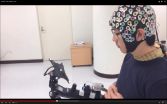'Molecular tweezer' targets HIV and prevents semen from promoting infection
Compound shaped like a tweezer could prove more effective at preventing HIV infection -- and with less side effects -- than other microbicides in development
2015-08-18
(Press-News.org) An unprecedented potential "molecular tweezer" called CLR01, reported in the journal eLife, not only blocks HIV and other sexually transmitted viruses, but also breaks up proteins in semen that boost infection.
Semen is the main vector for sexual HIV transmission. It contains proteins that assemble into very stable polymers called amyloid fibrils, which can enhance HIV infectivity by up to 10,000 times. Scientists led by the University of Pennsylvania (USA) and Ulm (Germany) now show that a molecule with the shape of a tweezer not only destroys HIV particles but also blocks the infection-promoting activity of semen amyloids.
The antiviral activity of CLR01 is based on the way it selectively interacts with and destroys the viral membrane. Remarkably, CLR01 does not affect other cell membranes, which suggests it could be safely incorporated into a vaginal or anal gel to prevent HIV infection - without the risk of side effects.
The way CLR01 operates means that it is also effective against many other sexually transmitted viruses, including Hepatitis C and viruses in the herpes family. It may also be effective against many other "enveloped" viruses including flu and Ebola. The use of other preventive treatments has been undermined in some countries by the stigma associated with HIV. As CLR01 is effective against many viruses besides HIV, it could be more widely acceptable as a general protective agent in communities struggling with HIV stigma.
Moreover, the scientists found that CLR01 also binds to amyloid fibrils and prevents the interaction with viruses that could be exploited by HIV to boost sexual transmission. The tweezer was even found to destroy mature fibrils, which are remarkably stable structures.
"We think that CLR01 could be more effective than other microbicides that are in development because of its dual action, its safety in terms of side effects and its potential broad application," says Professor James Shorter from the University of Pennsylvania School of Medicine.
"The tweezer has been tested and is safe in zebrafish and mice. The next step could be to assess safety and efficacy in non-human primates," says Professor Jan Münch from the University of Ulm.
The scientists anticipate that synthesising CLR01 in large quantities will be straightforward, which will facilitate its development as a microbicide.
INFORMATION:
Reference
The paper 'A molecular tweezer antagonizes seminal amyloids and HIV infection' can be freely accessed online at http://dx.doi.org/10.7554/eLife.05397 Contents, including text, figures, and data, are free to re¬use under a CC BY 4.0 license.
ELSE PRESS RELEASES FROM THIS DATE:
2015-08-18
A new study shown that meteorite impacts on ancient oceans may have created nucleobases and amino acids. Researchers from Tohoku University, National Institute for Materials Science and Hiroshima University discovered this after conducting impact experiments simulating a meteorite hitting an ancient ocean (Fig. 1).
With precise analysis of the products recovered after impacts, the team found the formation of nucleobases and amino acids from inorganic compounds. The research is reported this week in the journal Earth and Planetary Science Letters.
All the genetic information ...
2015-08-18
Children with better academic and behavioral functioning when they start kindergarten often have better educational and societal opportunities as they grow up. For instance, children entering kindergarten with higher reading and math achievement are more likely to go to college, own homes, be married, and live in higher-income neighborhoods as adults. Now a new study points to very early roots of differences in school readiness, with growth in vocabulary playing a particularly important role. The study found that children with larger oral vocabularies by age 2 arrived at ...
2015-08-18
Adolescents who have romantic relationships tend to have more problems with psychosocial adjustment. In contrast, young adults who have romantic relationships tend to have fewer problems with psychosocial adjustment. Although the links between having a romantic relationship and psychosocial adjustment change with age, a new longitudinal study has found that it's not just having a relationship that matters, but the quality of the relationship: Higher-quality romantic relationships are associated with fewer psychosocial difficulties across adolescence and young adulthood.
The ...
2015-08-18
Scientists working at Korea University, Korea, and TU Berlin, Germany have developed a brain-computer control interface for a lower limb exoskeleton by decoding specific signals from within the user's brain.
Using an electroencephalogram (EEG) cap, the system allows users to move forwards, turn left and right, sit and stand simply by staring at one of five flickering light emitting diodes (LEDs).
The results are published today (Tuesday 18th August) in the Journal of Neural Engineering.
Each of the five LEDs flickers at a different frequency, and when the user focusses ...
2015-08-18
A new test for offers the possibility of near real time monitoring of bone diseases, such as osteoporosis and multiple myeloma. The functionality of the test, which measures changes in calcium isotope ratios, has been validated on blood samples from NASA space shuttle astronauts.
Our bones are largely built of calcium, and the turnover of calcium can indicate the development of bone diseases such as osteoporosis and the cancer multiple myeloma. Geochemists have developed extremely accurate ways of measuring calcium isotope ratios, for example for the study of sea shell ...
2015-08-18
For an embargoed PDF, please contact Cara Graeff or 215-351-2513 or Angela Collom or 215-351-2514.
1. Anonymous essay exposes scandalous doctor behavior
Free abstract: http://www.annals.org/article.aspx?doi=10.7326/M14-2168
Editorial: http://www.annals.org/article.aspx?doi=10.7326/M15-1144
URLs go live when embargo lifts
An anonymous and provocative essay published in Annals of Internal Medicine exposes the dark underbelly of medicine where doctors displayed stomach-churning disrespect for vulnerable patients. The author describes teaching a medical humanities ...
2015-08-18
PHILADELPHIA - Websites for national and state health insurance marketplaces show evidence of improved efforts to assist patients in choosing health insurance plans, such as providing decision support tools, experts from the Perelman School of Medicine at the University of Pennsylvania have found. However, in a letter published in the August 18 issue the Annals of Internal Medicine, the Penn team recommends taking more steps to better support consumers in making informed health plan decisions.
The marketplaces, also called health exchanges, were established by the Patient ...
2015-08-17
Research has shown that a regular dose of aspirin reduces the long-term risk of cancer in those who are overweight in an international study of people with a family history of the disease.
The study, conducted by researchers at Newcastle University and the University of Leeds, UK, is published today in the Journal of Clinical Oncology.
They found that being overweight more than doubles the risk of bowel cancer in people with Lynch Syndrome, an inherited genetic disorder which affects genes responsible for detecting and repairing damage in the DNA. Around half of these ...
2015-08-17
Testing for genetic risk factors could improve treatment for myeloma - a cancer of the blood and bone marrow - by helping doctors identify patients at risk of developing more aggressive disease.
New research, published in the Journal of Clinical Oncology today (Monday), found as few as nine genetic features would need to be tested to identify high-risk patients who might benefit from intensive treatment.
The study, led by researchers at The Institute of Cancer Research, London, is the first to link genetic mutations in myeloma cells to the chances of surviving the disease.
The ...
2015-08-17
Drinking caffeinated coffee daily significantly reduced cancer recurrence and death in stage III colon cancer.
Greatest benefits were in those drinking four or more cups a day.
Researchers are not recommending people drink more coffee pending further studies.
BOSTON - Regular consumption of caffeinated coffee may help prevent the return of colon cancer after treatment and improve the chances of a cure, according to a new, large study from Dana-Farber Cancer Institute that reported this striking association for the first time.
The patients, all of them treated ...
LAST 30 PRESS RELEASES:
[Press-News.org] 'Molecular tweezer' targets HIV and prevents semen from promoting infection
Compound shaped like a tweezer could prove more effective at preventing HIV infection -- and with less side effects -- than other microbicides in development


